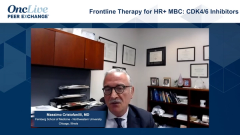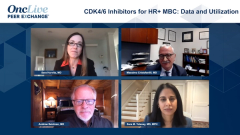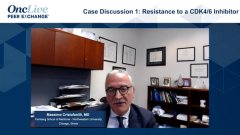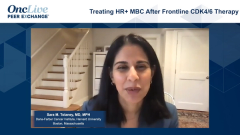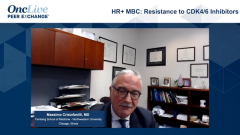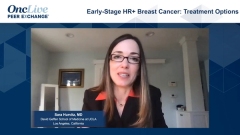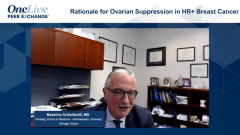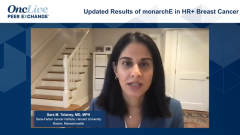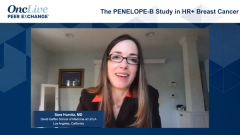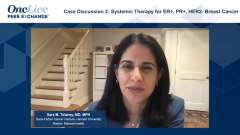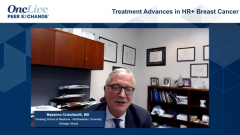
CDK4/6 Inhibitors for HR+ MBC: Data and Utilization
Episodes in this series

Sara Hurvitz, MD: Andrew, we have MONALEESA-3 and MONALEESA-7, which have shown overall survival benefit with ribociclib in the frontline setting. We’re still waiting for PALOMA-2 and MONARCH 3 in the frontline setting to read out in terms of survival. Does this impact your selection and the use of a CDK4/6 inhibitor in the frontline setting, or do you think these are all fairly similar drugs? Which of them are appropriate?
Andrew Seidman, MD: Some of us are old enough to remember the wars of the aromatase inhibitors. Is anastrozole better the letrozole? Is exemestane better than either? You know, Coke vs Pepsi, paclitaxel vs docetaxel wars. Happily, we’re not spending our time and energy doing these trials, comparing CDK4/6 inhibitors. As Massimo pointed out, the hazard ratios for PFS [progression-free survival] benefit are remarkably constant; population differences make it problematic to do cross-trial comparisons.
My own view, shared by a working group that I chaired for the NCI [National Cancer Institute] Breast Cancer Steering Committee, is that PFS still has primacy in the first-line setting for ER [estrogen receptor] positive HER2 [human epidermal growth factor receptor 2] negative. Our working group reported our consensus findings in the JCO [Journal of Clinical Oncology] a couple of years ago in a special article.
There are certainly many chapters to be written afterward. While it’s really nice to have OS [overall survival], and it’s compelling, whether OS is going to be driven by the event rate or the statistical power, you get the key value. My long-winded answer to your short question is that these 3 agents are much more similar than they are different in terms of efficacy. OS is nice to have but not needed in the first-line setting.
Sara Hurvitz, MD: Excellent. I’d like to ask you to expand a little on the toxicity profile of these 3 agents. Which toxicities do you find most challenging? Which do you think are consequential and inconsequential and really not much of a bother in how this impacts your selection?
Andrew Seidman, MD: That’s an important question because if one accepts that efficacy is more similar than different, then the only reason to pick and choose would be perceived differences and likely toxicities. So the commonality across the 3 CDK4/6 inhibitors in clinical use is the potential for neutropenia. But we feel pretty comfortable knowing how to manage that now by checking CBC [complete blood count] twice weekly in the first 2 months, perhaps at the first day of each of the next couple of cycles, then based on discretion afterward. The same applies for potential liver function abnormalities.
The issues of abemaciclib related to GI [gastrointestinal] toxicity distinguish it a bit from palbociclib and ribociclib. With experience and time and the use of antimotility agent’s physicians have really become comfortable using this agent, notably in the MONARCH trial the likelihood of discontinuing abemaciclib for diarrhea, for example, was quite low. And with ribociclib there’s still the need to do ECG [electrocardiogram] monitoring every 2 weeks in the first month to look for QT prolongation.
Sara Hurvitz, MD: The points you brought up are really the key toxicities we’re seeing. We have to overlay the fact that we are in the midst of a horrendous pandemic. Is that insulin staying in your selection of agents in terms of ones that have less neutropenia associated? Is that playing any role in how you select?
Andrew Seidman, MD: Yes, with grade 3 and 4 neutropenia—cross-trial comparisons were lower with ABEMA [abemaciclib] than with RIBO [ribociclib] and PALBO [palbociclib]. I’m not sure I consciously choose CDK4/6 inhibitor differentially because of the pandemic or make across-the-board dose reductions or tell patients to stay home and not come in for necessary monitoring.
We can all be afraid of COVID-19 [coronavirus disease 2019], and we should be. But our patients fear the cancer that they have, the known rather than the unknown.
Sara Hurvitz, MD: Absolutely. I agree. Massimo, when you’re treating a patient with the CDK4/6 inhibitor, are there particular patients for whom you’re most worried about toxicity? Who are patients that, as Sara described, really are the highest risk where you might consider not using a CDK4/6 inhibitor because of their situation, their characteristics?
Massimo Cristofanilli, MD: As we said, comorbid conditions may drive the choice. We haven’t seen an increase in infections, including viral infections with CDK4/6. In clinical practice I have seen in our clinic some cases of COVID-19 irrespective of the CDK4/6. So I would say the neutropenia probably doesn’t increase risk of COVID-19; it’s an independent prior infection. Even the length of infection seems to be relatively independent disease. If you’re a younger patient, maybe you have symptomatic disease. Just to close the chapter on COVID-19, that should not be a driver for change.
But we have seen patients who have comorbid conditions but are unable to get to the hospital because of COVID-19. Patients with inflammatory bowel disease were begging me not to give a drug that would produce diarrhea. I didn’t do it. They responded, of course, to Ibrance without having a problem.
There are some other patients who were started on palbociclib and developed a neutropenia very quickly. We had to drop the dose to 75 mg.
Transcript Edited for Clarity


